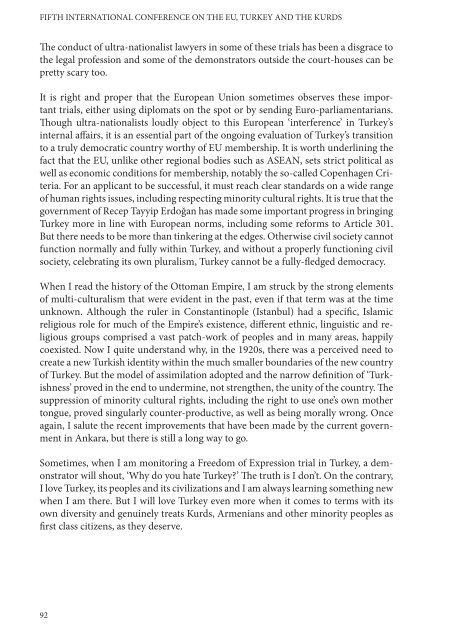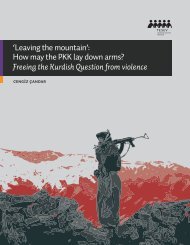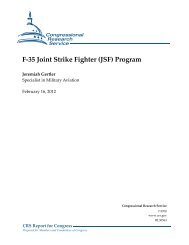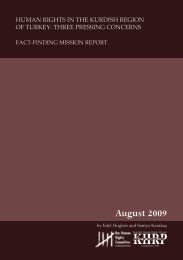FIFTH INTERNATIONAL CONFERENCE ON THE EU TURKEY AND THE KURDS
fifth international conference on the eu, turkey and the kurds
fifth international conference on the eu, turkey and the kurds
Create successful ePaper yourself
Turn your PDF publications into a flip-book with our unique Google optimized e-Paper software.
<strong>FIFTH</strong> <strong>INTERNATI<strong>ON</strong>AL</strong> <strong>C<strong>ON</strong>FERENCE</strong> <strong>ON</strong> <strong>THE</strong> <strong>EU</strong>, <strong>TURKEY</strong> <strong>AND</strong> <strong>THE</strong> <strong>KURDS</strong><br />
The conduct of ultra-nationalist lawyers in some of these trials has been a disgrace to<br />
the legal profession and some of the demonstrators outside the court-houses can be<br />
pretty scary too.<br />
It is right and proper that the European Union sometimes observes these important<br />
trials, either using diplomats on the spot or by sending Euro-parliamentarians.<br />
Though ultra-nationalists loudly object to this European ‘interference’ in Turkey’s<br />
internal affairs, it is an essential part of the ongoing evaluation of Turkey’s transition<br />
to a truly democratic country worthy of <strong>EU</strong> membership. It is worth underlining the<br />
fact that the <strong>EU</strong>, unlike other regional bodies such as ASEAN, sets strict political as<br />
well as economic conditions for membership, notably the so-called Copenhagen Criteria.<br />
For an applicant to be successful, it must reach clear standards on a wide range<br />
of human rights issues, including respecting minority cultural rights. It is true that the<br />
government of Recep Tayyip Erdoğan has made some important progress in bringing<br />
Turkey more in line with European norms, including some reforms to Article 301.<br />
But there needs to be more than tinkering at the edges. Otherwise civil society cannot<br />
function normally and fully within Turkey, and without a properly functioning civil<br />
society, celebrating its own pluralism, Turkey cannot be a fully-fledged democracy.<br />
When I read the history of the Ottoman Empire, I am struck by the strong elements<br />
of multi-culturalism that were evident in the past, even if that term was at the time<br />
unknown. Although the ruler in Constantinople (Istanbul) had a specific, Islamic<br />
religious role for much of the Empire’s existence, different ethnic, linguistic and religious<br />
groups comprised a vast patch-work of peoples and in many areas, happily<br />
coexisted. Now I quite understand why, in the 1920s, there was a perceived need to<br />
create a new Turkish identity within the much smaller boundaries of the new country<br />
of Turkey. But the model of assimilation adopted and the narrow definition of ‘Turkishness’<br />
proved in the end to undermine, not strengthen, the unity of the country. The<br />
suppression of minority cultural rights, including the right to use one’s own mother<br />
tongue, proved singularly counter-productive, as well as being morally wrong. Once<br />
again, I salute the recent improvements that have been made by the current government<br />
in Ankara, but there is still a long way to go.<br />
Sometimes, when I am monitoring a Freedom of Expression trial in Turkey, a demonstrator<br />
will shout, ‘Why do you hate Turkey?’ The truth is I don’t. On the contrary,<br />
I love Turkey, its peoples and its civilizations and I am always learning something new<br />
when I am there. But I will love Turkey even more when it comes to terms with its<br />
own diversity and genuinely treats Kurds, Armenians and other minority peoples as<br />
first class citizens, as they deserve.<br />
92





